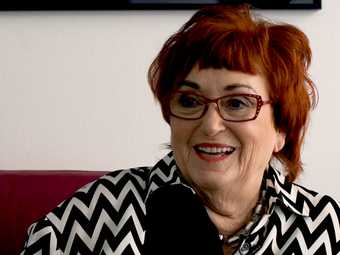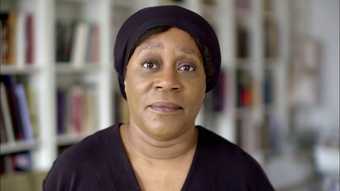These boots were for a show that I did in Miami called 'Brujas, Putas y Locas'.
Three terms in which a woman usually is professionally disqualified in the art world.
Whether they are a bitch or witch or crazy. It's a mock-up for a monument for all women that have been killed or massacred. It marks the transition from martyrdom to the erotic creature of a woman
I'm part of a big family that comes from farm culture, very macho. Art and creativity were not on the table.
I come from a family of immigrants to South America and then I emigrated to the United States. Cultural translation is kind of the core of what I'm always kind of going around in my work. It has to do with the mass culture, the aesthetics. It has to do with how we as a society relate to each other. Our own disagreements within this understanding there's a lot of meaning and that's the place that I love to work in artist.
News Anchor: ‘Artist Judy Werthein has designed a pair of sneakers that she will gladly sell you for a modest two hundred dollars but for illegal aliens trying to sneak across our broken borders, she gives them away free’.
Judi: 'Brinco' which means to jump it was addressing the whole issue of movement of things and people and addressing global labour. So, through this object that belongs to mass culture like a sneaker all these things could be addressed. I'm actually creating an object that makes us talk about this situation of immigration in the US.
News anchor: ‘- But if this helps them break the law then isn't this an illegal object?’
Judi: Depending on which kind of network it was, I was a criminal or I was the incarnation of Che Guevara in a woman. I mean that level of like extreme and in that case, I became the object. Which is something that we women know very well [laughs].
I moved to Miami from New York, it was amazing because it gave me a lot of room to re-evaluate things. My interest is to relate to the masses not to the small circle of the art world and I realise how small the conversations that we were having in the art world where. It was restrictive in the same way I found my body restricted. I found myself intellectually restricted.
[Judi driving in a car] This is all the Haitian neighbourhood where my studio is. I really like this neighbourhood, people are beautiful. Miami is like the hinge between the south and the north of the continent, it's this kind of place that is in no place, this kind of paradise that has been built in a swamp, this kind of bright shiny luxury, entertainment, party sex, objects, fashion, experiences.
These hotels, and the spas, it's not real wealth, it's a representation of wealth. It's appearances, it's about how things appear, how things look, the bling, how things shine.
[Latino music]
I like a constant diversity in everything. In people, in my conversations, in food. Miami is the Latin America of the U.S. Literally. It's funny because Florida is the state that always defines the elections here.
It's a huge Argentine community, a huge Venezuelan community. A humongous Cuban community
Caribbean, Bahamian [car honk]
Sorry! … Sorry motherfuckers.
I mean the work kind of accompanies who you are, in a way. It's like you live your life and then from
that you produce. It's about experiences, creating these moments in which certain things or crossings happen that would not happen in daily life or in public spaces.
'Manicurated' it was a piece that I did it in New York at the Bronx Museum in 2002. People will come to the salon and pick the artworks that they wanted on their nails. Taking these images that belong to the museum, which is a public collection, in their hands.
Nail salon visitor: ‘- I'm taking the art with me, I'm taking it home gonna enjoy this as long as I can I got nails for the weekend!’
Judi: You would have on one station, I don't know, a curator of MoMA having her nails done and on the other one like a homeless woman so it created a conversational situation around this activity of the nails. It was fun, it was a lot of fun.
Living in Miami was transformative for me, it was different from my experience of living in Metropolis. The weather, the fact that I could have a healthier life and that kind of drove me to this different connection with the body. I'm so grateful for that to Miami It's like having a contract with yourself, of being fully true to yourself.
My experience is as a woman, it cannot be any other experience. I cannot talk for any other place and I think that now we shifted into a new territory of women embracing our beauty and feeling sexy and feeling hot and acknowledging that our sexuality is power, not hiding it or pretending it's not there it is there. We need to pussify art world you know [laughs]


